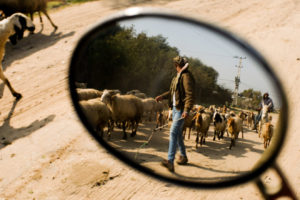Sulaiman Abu-Said would leave on his camel from an-Naqab at 5:00 am, arrive in Gaza at 7:00 am, sell his goods, and go back home at 5:00 pm. But that is history now. Today, Israel would never allow this to happen.
Moving without borders and traveling without restrictions is part of the nomads’ identity and way of life, but Israel destroyed that too.

During the 19th century and the first half of the 20th century, the semi-arid region of the an-Naqab was inhabited mostly by semi-nomadic Bedouin tribes.
Heavily armed Jewish militias attacked an-Naqab in 1948. During the Nakba they killed many Palestinians and forced even more to leave. Some of them left for Jordan, some for the Sinai Peninsula, some for other cities in north Palestine and some for Gaza. And some remained, steadfast, only to be treated as 4th class citizens by Israel.
My grandfather had to leave for Gaza with his wife and children. He never thought that the land he was just crossing on his camel to get to the market to sell his goods would be his new, and final, home.
Like tens of thousands, my grandfather was de-Bedouinised by Israel when he was imprisoned in Gaza. He could no longer ride for days. He could no longer have breakfast at home, lunch in Gaza, and dinner in Egypt. Israel severed all these ties.
Israel turned his intact homeland of sand and mountains to a group of settlements and urban buildings. My ancestors’ homes grew in an-Naqab. There were tents made of camel and goat hair scattered here and there. They had no doors or windows. Their neighborhood consisted of the tents of people who shared the same blood.
But that was home, nevertheless, a home now ravished by Israeli colonialism.
Israelis’ homes were soon planted in an-Naqab. They are made of concrete. They have armed doors and windows. Their neighborhood consists of many annoyingly modern, organized, and similar blocks that were given to every Tom, Dick, and Harry collected from here and there.
My grandfather used to spend his winters in an-Naqab and his summers in Gaza or close to it. He took part in WWI and fought with the Turks against the British. Riding a horse and holding a rifle he went to engage the British soldier in his plane and tank. He was a fighter who had to defend his home.


